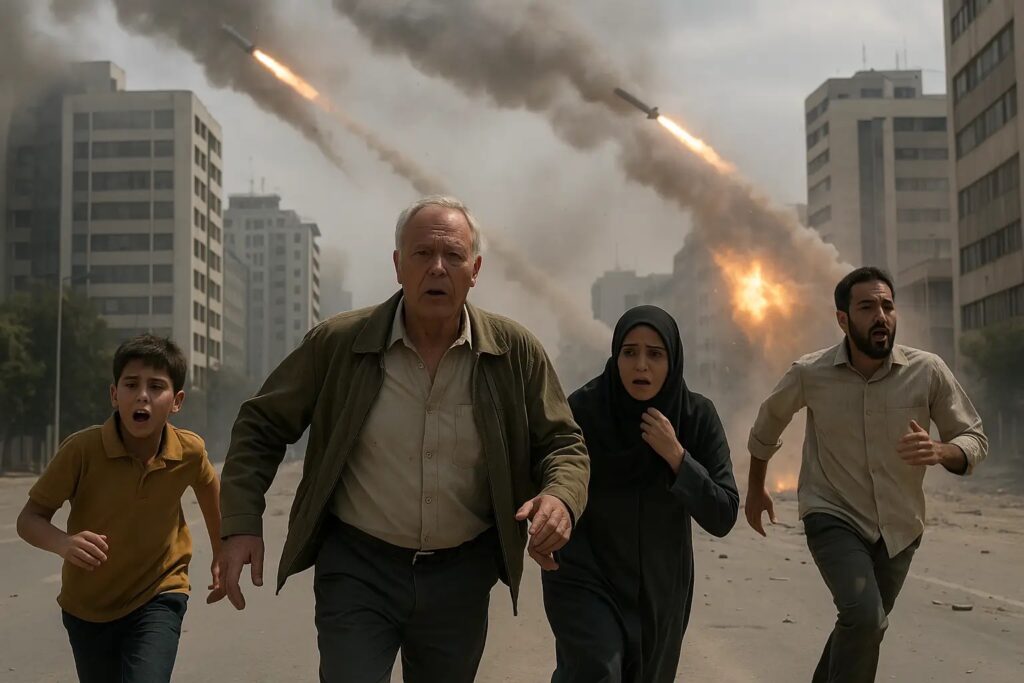The crisis in the Middle East deepened further on June 17, 2025, as Iran and Israel exchanged deadly missile attacks, escalating tensions to alarming levels. Former U.S. President Donald Trump has issued a bold statement urging residents of Tehran to evacuate immediately, warning that the city could be at the center of catastrophic retaliation.
A War Spiraling Out of Control
In the early hours of Tuesday, Iran launched a fresh barrage of missiles targeting multiple Israeli cities, including Tel Aviv and Haifa. In response, the Israeli military retaliated with precision airstrikes deep inside Iranian territory, reportedly hitting strategic sites in Tehran and Esfahan.
This marks the most dangerous escalation between the two arch-rivals since the April clashes that had already brought the region to the brink of a full-scale war.
Trump’s Message to Tehran Residents
Donald Trump, who remains a dominant figure in global politics despite being out of office, released a statement through his media platform warning civilians in Tehran to “get out while they still can.” He claimed, without presenting direct evidence, that Israel’s next strike would target key government facilities and military installations in the capital.
“Tehran is no longer safe,” Trump said. “If you value your life, flee now.”
While the message sparked panic on Iranian social media, it also drew criticism from global diplomats who viewed it as an unnecessary provocation during an already fragile moment.
Iran’s Response: Defiance, Not Retreat
Iran’s leadership brushed off Trump’s remarks. A senior Iranian commander called the warning a “psychological tactic” meant to sow fear among civilians. Iranian officials insisted that the people of Tehran would not bow to fear or pressure.
On state television, Iran’s Supreme Leader Ayatollah Khamenei appeared briefly and declared, “We do not run from threats. Tehran stands strong.”
Meanwhile, reports emerged of Iran boosting its air defense systems and placing ballistic missile units on high alert in strategic regions.
Global Reactions and Warnings of Wider War
UN, China, and Russia Urge Restraint
As the conflict escalated, world leaders appealed for calm. The United Nations issued a statement urging both Israel and Iran to “immediately cease hostilities and return to diplomatic channels.”
China and Russia also warned that continued fighting could destabilize the entire Middle East and possibly ignite a larger regional war. Moscow’s foreign ministry specifically condemned Trump’s remarks, calling them “reckless and incendiary.”
Civilians Caught in the Crossfire
Tragically, as the missile strikes rain down, it’s the innocent civilians who bear the brunt. In Tehran, hospitals reported treating hundreds for injuries caused by blast waves and debris. In Tel Aviv, emergency services responded to scenes of destruction where several residential buildings had been hit.
International aid organizations have raised alarms over the growing humanitarian toll and are calling for immediate ceasefire negotiations.
Is a Full-Scale War Now Inevitable?
With both Iran and Israel refusing to back down and powerful figures like Trump fueling the fire, analysts warn that a full-scale war is no longer a distant possibility—it may already be underway.
Military analysts predict the next 48 hours could be decisive. If Israel does indeed strike the heart of Tehran, Iran’s counterstrike might not just target Israeli cities but extend to U.S. bases and allies in the region, plunging the entire Middle East into war.
Conclusion: A World on Edge
The Israel-Iran conflict has entered a volatile and highly unpredictable phase. Trump’s call for Tehran residents to evacuate adds a dangerous new layer of panic to an already explosive situation.
Whether diplomacy can still salvage peace or if the world is witnessing the beginning of a new war remains to be seen—but for now, millions in the region are living on the edge.

